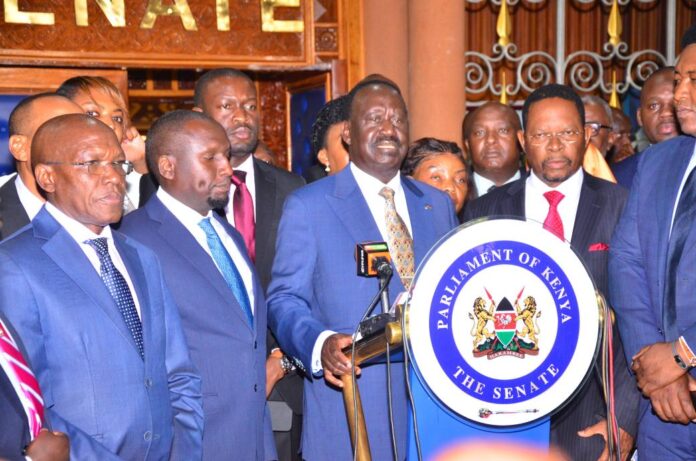Written by Faith Mwende
Former Prime Minister Raila Odinga has called for enhanced powers for Kenya’s Senate, urging lawmakers to align its authority with that of the United States Senate to enable it to fully perform its constitutional duties.
Speaking on Thursday at Parliament Buildings, Raila emphasized that both chambers of Parliament, the Senate and the National Assembly, must function within their defined mandates for effective lawmaking and governance.
“Senate need to play its role, just as the National Assembly has also resumed playing. We have got countries with a similar constitutional structure, and it worked very well,” Raila stated.
He further argued that only through clear roles and mutual cooperation can Parliament fulfill its purpose of representation, legislation, and oversight.
“So let’s see our Senate work just like the Senate of the United States of America, and give it proper powers and responsibilities. Same thing.”
The former Prime Minister also highlighted the importance of allowing each House to independently carry out its responsibilities without interference.
“So the National Assembly has also its sphere, and you say the National Assembly should do its work, and together, both National Assembly and the Senate form the Parliament, and Parliament’s role is to represent, to legislate and to oversight.”
Raila stressed that Parliament plays a central role in governance, with the executive relying on its legislative output and the judiciary providing interpretation.
“The executive uses the laws that are passed by Parliament to govern the country, the judiciary interprets, this is how we want it to be.”
His remarks come at a time when tensions between the Senate and the National Assembly are resurfacing particularly over the exclusion of the Senate from the vetting process for new members of the Independent Electoral and Boundaries Commission (IEBC).
Senators have publicly opposed being left out, insisting that the reconstitution of the IEBC is a matter of national interest.
“In our considered view, this is a process that should be undertaken jointly by both Houses, as has been the practice with the approval of nominations to key state offices,” said Hillary Sigei, chairperson of the Senate’s Justice and Legal Affairs Committee.
This latest standoff feeds into ongoing supremacy battles between the two Houses battles that have now found their way into the Constitution of Kenya Amendment Bill, 2025.
The Bill, introduced by Nyamira Senator Okong’o Omogeni, proposes reforms aimed at strengthening the Senate’s independence.
Key proposals include abolishing the current Parliamentary Service Commission, which is chaired by the National Assembly Speaker, and replacing it with two separate commissions for each House, to be led by their respective Speakers. A joint committee would handle shared matters between the two bodies.
The Bill also seeks to empower the Senate to vet top officials such as the Chief Justice, Deputy Chief Justice, Director of Public Prosecutions, Auditor General, Controller of Budget, and heads of independent commissions.
It proposes giving the Senate more influence in the budget process by allowing it to amend estimates with such changes requiring a two-thirds majority vote by county delegations. Any overturn by the National Assembly would require 233 votes.
Additional reforms in the Bill include requiring the Kenya Defence Forces to notify the Senate whenever troops are deployed for domestic security operations, and replacing the National Assembly Speaker with the Senate Speaker as chair of tribunals involved in judicial removals.
“The roles of both Houses should be defined,” the Bill asserts.



















